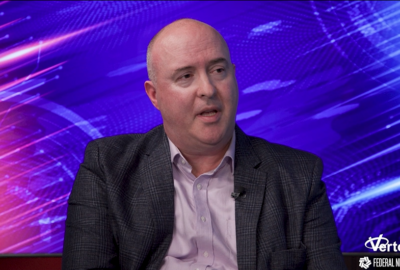
Insight by Dataiku
Industry Exchange Data 2023: Want to accelerate AI use? Bring it to the people
Dataiku’s Doug Bryan has a “more the merrier” approach to promulgating the use of AI. He talks with The Federal Drive’s Tom Temin about why making user-...
Do you want to get more value out of your agency’s data? Here’s one way: Make the tools of data analysis and application building usable and available to regular people, not just data scientists and programmers.
“Imagine an organization of 10,000 or 100,000 people. If you had 10 data scientists working on AI, do you think those 10 people could have a big effect on the 100,000? Probably not,” said Doug Bryan, field chief data officer at Dataiku.
Research has shown that if 10% of the employee population becomes versed in these technologies, “you can get some very serious positive return on investment,” Bryan said during Federal News Network’s Industry Exchange Data.
This phenomenon has proven true in fields as diverse as financial management and locomotive manufacturing. It can work in government too, he said, adding that “people underestimate the amount of talent that’s there.”
Create ways for nontechies to take advantage of AI/ML
Dataiku developed a set of tools it calls a workbench. The workbench lets any employee explore and model data and develop AI applications themselves, Bryan said. It’s specifically designed to let subject matter experts who are not data scientists or AI experts benefit from those technologies, he said.
Bryan cited a large packaged goods manufacturer that trained 300 people in data and AI, but only 15 of them were data scientists. Analyzing 9 billion social media signals yielded millions of potential new product ideas. Of the 40 actually launched, 20 succeeded beyond expectations — a far higher percentage than normal in that industry, Bryan said.
An international bank had 70 people producing 600,000 reports each year with data kept in Excel. Using Dataiku’s workbench, the bank enabled the same work by only two people, who produced more streamlined and concise projections for analysts, he shared.
Bryan suggested that promising domains for grassroots AI in government include procurement and finance.
Develop end-to-end data capability
Effective tools must let people perform the full lifecycle of data-based projects, Bryan said, starting with discovering and identifying sources of data, exploring the data, and then cleaning it by removing incomplete or bad fields.
“Then building models and deploying the models,” Bryan said. “And then most importantly, monitoring the models.”
Workbenches must be easy to learn and use to prevent serious mistakes.
“A lot of things in data science models are easy to prevent, like ‘overfitting’ and ‘underfitting’ things that have been around in statistics for nearly 100 years,” Bryan said. He added, “We also have to monitor these models continuously for drift and bias.”
Beyond the automation of model creation and monitoring, a workbench should produce AI programs with transparency, meaning it can explain the results, he said.
“If you have a promotion model, and it says Sam is more likely to succeed in that position than Susan, well, the user should be able to ask why,” Bryan said.
People need to be able to get a justification for the outcomes that AI algorithms produce. It’s as simple as that, he said. Transparency ensures trust in the models among the people who must live with their findings, Bryan said.
What’s more, he advised that organizations will increase their chances of success by planning for change.
“It seems circular. But most people don’t plan for the change management part of it,” he said. Dataiku has a 25-point program it can take customers through, encompassing gamification, employee leave to participate in hackathons, even simply issuing laptop stickers for people who have achieved various certifications.
“Doing those kinds of things regularly is really the key to success,” Bryan said. “And as we’ve seen from cloud computing, the technology is not the bottleneck anymore. It’s getting those domain experts to start working on AI.”
Check out all the sessions from Federal News Network’s Industry Exchange data on our event page.
Copyright © 2024 Federal News Network. All rights reserved. This website is not intended for users located within the European Economic Area.
Related Stories

Protected: Intelligent automation and cloud marketplaces help agencies optimize cost and speed cloud adoption

All agencies to give grant funding opportunities a facelift
Featured speakers
-

Doug Bryan
Field Chief Data Officer, Dataiku
-

Tom Temin
Host, The Federal Drive, Federal News Network
Upcoming Events
Related Stories
Top Stories

Doug Bryan
Field Chief Data Officer, Dataiku
Doug Bryan is a Field CDO at Dataiku. His role is to help large organizations grow from 10 to 1,000 AI/machine learning practitioners. His background includes being a lecturer in computer science at Stanford University, head of the product recommendations team at Amazon.com, Accenture Labs manager, and Senior Vice President for Data Science Products at Dentsu International. He has 25 years of data science experience and has done consulting worldwide in many industries.

Tom Temin
Host, The Federal Drive, Federal News Network
Tom Temin has been the host of the Federal Drive since 2006 and has been reporting on technology markets for more than 30 years. Prior to joining Federal News Network, Tom was a long-serving editor-in-chief of Government Computer News and Washington Technology magazines. Tom also contributes a regular column on government information technology.



